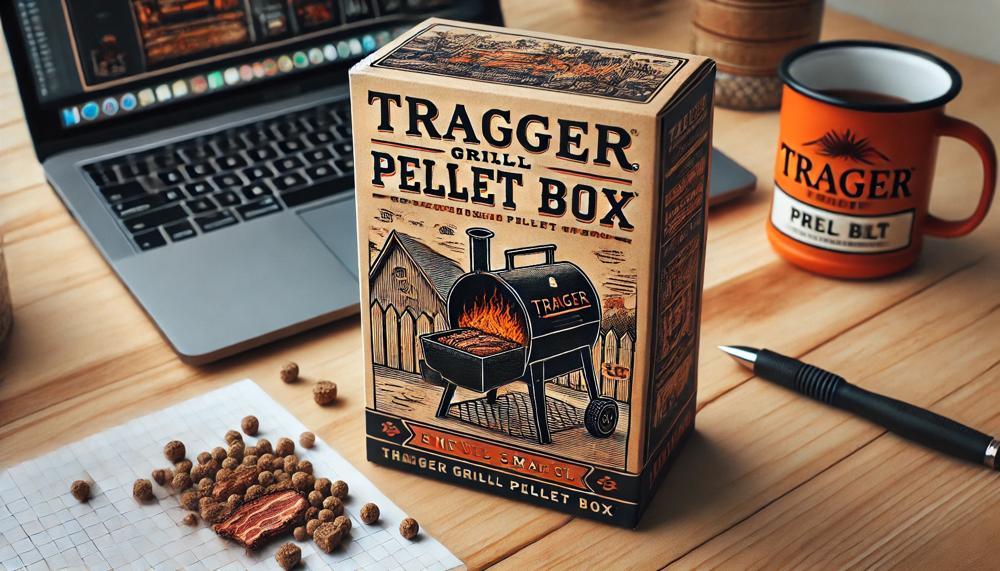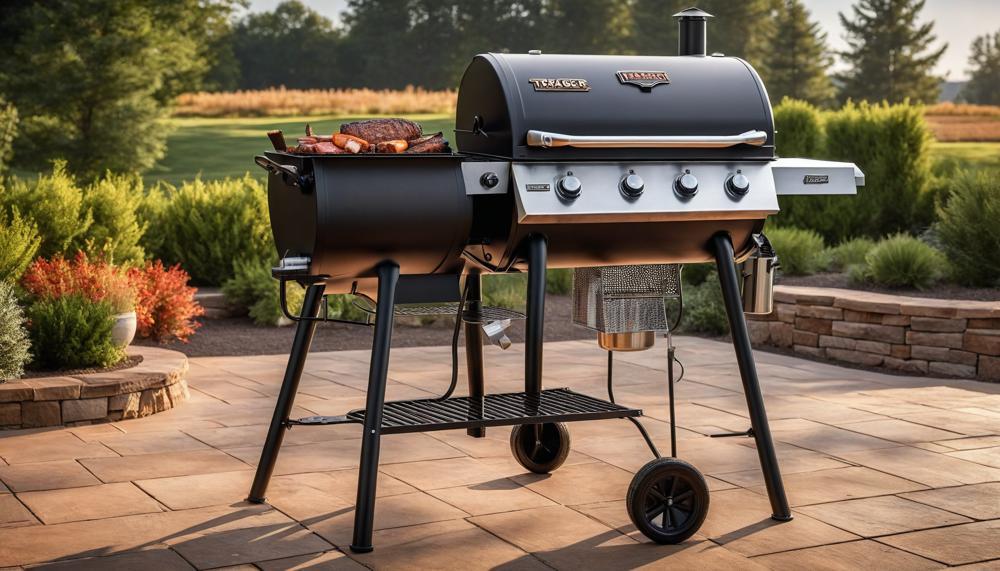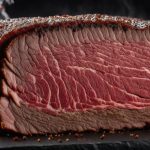Is excessive smoke from your Traeger grill’s pellet box causing you worry? Yes, it’s a common concern among users, and it’s crucial to address it promptly to ensure both the quality of your grilling and your safety. Excessive smoke can signal issues that need immediate attention, such as potential fire hazards or operational malfunctions.
In this blog post, we’ll delve into why your Traeger grill might be smoking more than usual and how you can fix it. Whether it happens during cooking or after shutdown, understanding the cause is key to finding a solution. Here’s what you need to know to get your grill back to its best:
- Understanding the Issue: We’ll explain what causes excessive smoke in pellet boxes and why it’s a problem.
- Practical Solutions: Step-by-step guidance on remedies like cleaning the drip tray, ensuring pellet dryness, and enhancing airflow.
- Safety Tips: How to safely manage and prevent excessive smoke to avoid any risks of fire.
- Maintenance Advice: Regular checks and maintenance tips to keep your grill in optimal condition.
- Expert Insights: Advice from Traeger support forums and other users who have tackled similar issues.
Grill masters, read on to learn how to handle excessive smoke from your Traeger grill effectively and safely.
Contents
5 Reasons Why Your Traeger Grill is Smoking Too Much
| Reason | Description | Remedies |
| Improper Airflow | Blocked air paths prevent smoke from exiting efficiently, causing accumulation within the grill. | Clean and clear the air intakes and chimney vents to ensure free movement of air. |
| Grease Build-up | Excessive grease on the grill tray can ignite, leading to increased smoke production. | Regular cleaning of the grill tray to remove grease and residue. |
| Faulty Fan System | If the fan malfunctions, it can result in improper smoke ventilation or even push smoke back into the pellet box. | Check the fan for operational efficiency and seek repairs or replacement if necessary. |
| Pellets in Auger Tube | Pellets that catch fire in the auger tube create excessive smoke and potential fire hazards. | Empty the hopper, burn through the auger pellets, and ensure pellets are dry and stored properly. |
| Chimney Ash and Dust Build-up | Accumulation of ash and dust in the chimney after shutdown can cause smoldering and smoke. | Use a compressor to blow out dust and ash from the chimney and vents periodically. |
These issues underline the need for regular maintenance and vigilance while operating your Traeger grill.
Addressing these factors will not only reduce excessive smoke but also enhance your grilling experience, ensuring safety and delicious results.
6 solutions to Control the Smoke Coming out of Traeger Grill Pellet Box
| Solution | Details | Additional Resources |
| Check Fan Operation | Ensure the fan next to the pellet hopper is functioning properly to facilitate optimal air circulation. | Traeger Support |
| Clean Grease Build-Up | Regularly clean the grill tray to prevent grease accumulation, which can impede airflow and increase smoke production. | Traeger Maintenance Tips |
| Manage Pellet Burn | During shutdown, limit the oxygen supply by closing the grill lid to prevent pellets in the auger from continuing to burn. | Traeger Learning Center |
| Regular Maintenance | Clean the hopper and auger tube periodically to remove ash and debris, ensuring clear pathways for air and reducing smoke output. | Traeger Maintenance Tips |
| Empty Pellets After Use | After grilling, empty the hopper and allow any remaining pellets in the auger to burn off, which helps to stop smoke cycles post-shutdown. | Traeger Learning Center |
| Compressor for Chimney Vents | Use a compressor to blow out dust and ash from the chimney vents to maintain clear exhaust paths. | Traeger Support |
This table summarises practical actions to mitigate excessive smoke from your Traeger grill.
Regular checks and maintenance, like ensuring the fan operates correctly and cleaning the grill tray, are key. Restricting airflow by closing the lid during shutdown and clearing the hopper after use are also effective strategies.
Additionally, maintaining clean air pathways, including the chimney vents, is crucial for optimal grill operation.
Can a Traeger Pellet Grill Catch on Fire?
| Can a Traeger Pellet Grill Catch on Fire? | ||
| Yes | No | Prevention Tips |
| Yes, a Traeger Pellet Grill can catch fire. | No, if properly maintained. | To prevent fires, follow these tips: |
| Excessive pellets in firepot | Regularly clean drip tray | Use a drip tray liner |
| Check pellet moisture | Inspect and clean hopper | Monitor pellet feed |
| Ensure proper ventilation | Clear auger tube | Perform routine maintenance |
Yes, a Traeger Pellet Grill can catch on fire if not properly maintained. Pellet grills are susceptible to fires primarily due to issues like excessive pellets in the firepot or accumulation of grease on the drip tray. To prevent such incidents, it’s crucial to take proactive measures:

- Manage Pellet Usage: Avoid overloading the firepot with pellets, as this can lead to uncontrolled combustion.
- Clean Regularly: Keep the drip tray clean to prevent grease buildup, which can ignite under high temperatures.
- Pellet Quality: Ensure pellets are dry to prevent clumping, which can disrupt the feeding mechanism and lead to overheating.
- Use Safety Accessories: Employ a drip tray liner to facilitate easier cleanup and reduce the risk of grease fires.
- Routine Maintenance: Regularly inspect and clean the hopper and auger tube to maintain proper pellet feeding and combustion.
- Ventilation: Ensure proper ventilation around the grill to prevent smoke buildup and potential fire hazards.
By following these tips, you can enjoy safe and efficient grilling with your Traeger Pellet Grill without the risk of fire hazards.
Should Traeger Grill Pellet Box Smoke All the Time?
No, the Traeger Grill pellet box should not smoke all the time. Constant smoking from the pellet box signals an issue that requires immediate attention. Here’s why and what you can do about it:
| Issue | Explanation | Solution |
| Smoke from Pellet Box | Indicates improper airflow or an obstruction preventing normal smoke discharge through the smokestack. | Inspect and clean the smokestack for obstructions, such as bird nests, and ensure proper ventilation. |
| Obstructed Smokestack | Birds, particularly sparrows, may build nests in the smokestack if it’s left uncovered, causing smoke to back up into the pellet box. | Remove the conical “roof” of the smokestack and clear any blockages. Install a cover to prevent future obstructions. |
| Improper Start Procedure | Starting the grill with the lid closed can cause smoke to build up in the wrong areas. | Begin with the lid open until the fire is established, then close the lid to direct smoke through the smokestack. |
By ensuring that smoke exits properly through the smokestack, you maintain the grill’s efficiency and avoid potential hazards.
How to Get More Smoke from My Traeger Grill?
To enhance the smoke output from your Traeger grill and imbue your dishes with a deeper smoky flavor, consider these targeted strategies:
Adjust the Pellet Quality and Type:
Use high-quality, hardwood pellets designed for maximum smoke output.
Different wood types like hickory, mesquite, or apple can vary in flavor intensity and burn characteristics.
Modify the Cooking Temperature:
Lower cooking temperatures generally produce more smoke.
Aim for the “Smoke” setting or keep the temperature under 225°F (107°C) for the initial stages of cooking.
Experiment with a Smoke Tube:
Add a smoke tube filled with pellets to your grill.
This tool smolders pellets, producing additional smoke without significantly raising the grill temperature.
Maintain Your Grill:
Regular cleaning of the grill’s internal components, such as the firepot, drip tray, and chimney, ensures better airflow and more efficient pellet combustion.
Prevent Pellet Humidity:
Store your pellets in a dry environment to avoid humidity, which can decrease smoke production and affect pellet burn.
Conclusion
As we’ve explored in our discussion about excessive smoke from your Traeger grill, the root causes range from clogged air paths to moisture-laden pellets, each contributing to a less-than-ideal grilling environment. Whether your issue is a blocked chimney from an enthusiastic sparrow’s nest, a buildup of unburnt pellets, or the unfortunate malfunction of a critical fan, the solutions are straightforward yet vital.
Addressing these issues is not just about troubleshooting; it’s about restoring your grill to its peak performance. Think of your Traeger as a finely tuned orchestra, where each part—from the pellets to the exhaust—must perform in harmony. Regular maintenance, much like the rehearsals of a symphony, ensures each section plays its part perfectly, keeping the music of your grill—its smoke—rich but controlled, enhancing the flavor of your meals without overwhelming them.
Embrace these practices: Clear your vents, check your fans, and manage your pellets with care. By doing so, you’ll transform excessive smoke from a troubling sign into a hallmark of culinary excellence, all while ensuring your grilling is as safe as it is delicious.






